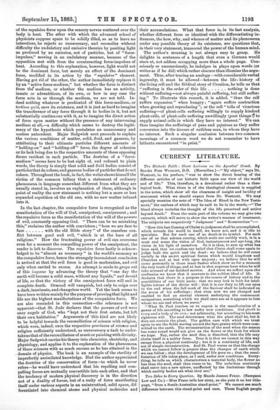CURRENT LITERATURE.
Westcott, in his preface, "was to show the direct bearing of the different articles of our historic faith upon our view of the world
and of life." This, therefore, is a devotional rather than a theo- logical book. What there is of the theological element is supplied
in the notes, which show all the clearness of insight and lucidity of statement which we should expect from Dr. Westcott. We may specially mention the note of " The Idea of Blood in the New Testa- ment," the nucleus of which may be said to lie in the words,—" The blood always includes the thought of the life preserved and active beyond death." From the main part of the volume we may give two extracts, which will serve to show the writer's manner of treatment. The subjects are respectively " Judgment " and "Resurrection ":— "How this last Coming of Christ to judgment shall be accomplished, which reveals the world to itself, we know not, and it is idle to speculate. But for each one of us death is its symbol. For each one of us that solemn coming, which seals our earthly work, is in a most real sense the vision of God, instantaneous and ago-long, the vision in his light of ourselves. So it is then, to sum np what has been said, that we confess our belief that Christ shall come again to judge both the quick and the dead : we believe that he will come socially in the secret spiritual forces which mould kingdoms and Churches and at last with open majesty ; we believe that he will come personally in those inner flashes which show us for a moment the very truth of things, and at last in that supreme hour when he will take account of our finished service. And when we reflect upon the confession we know that it answers to the noblest ideal of life. It declares that there is a purpose in the course of history and in the possibilities of our little parts : that we may look in both for intel- ligible tokens of the divine will : that it is our duty to lift our eyes to the end when the full work of the Saviour shall be indicated on the scene of his sufferings : that even now we are charged and enabled to find an eternal element underlying the commonest occupations, something which we shall once see as it appears to him whose we are and whom we serve."
" What St. Paul teaches us to expect is the manifestation of a power of life according to law under new conditions. God giveth to erery seed a body of its own : not arbitrarily, but according to his most righteous will. The seed determines what the plant shall be, but it does not contain the plant. The golden ears with which we trust again to see the fields waving are not the bare grains which were com- mitted to the earth. The reconstruction of the seed when the season has come round would not give us the flower or the fruit for which we hope. Nay, rather the seed dies, is dissolved, that the life may clothe itself in a nobler form. Tree it is that we cannot in this way escape from a physical continuity ; but it is a continuity of life, and not of simple reconstruction. And St. Paul warns as that the change which we cannot follow is greater than the changes of earth which we can follow ; -that the development of life goes on ; that the mani- festation of life takes place, as I said, under new conditions. Every- thing, he tells us, which characterises a material body, the flower no less than the seed, shall then cease to be. The unbroken continuity shall enter into a new sphere, unaffected by the limitations through which earthly bodies are what they are."


































 Previous page
Previous page